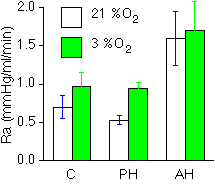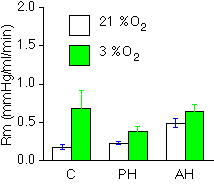LONG-TERM EFFECTS OF PERINATAL INSULTS
The most profound changes of the pulmonary circulation occur at
the time of birth. During the fetal life, the blood flow through
the lungs is low, blood pressure and vascular resistance are high,
and the vessels are thick-walled. Within minutes after the birth,
the blood flow drastically increases, pressure and resistance
drop, and the thickness of the pulmonary vessels starts to decrease.
We hypothesized that adverse stimuli, acting in this critical
period, might have more profound consequences for the pulmonary
circulation than the same stimuli acting later in life. This hypothesis
was tested in the following studies:
Hampl V., Herget J.:
Perinatal hypoxia increases hypoxic pulmonary vasoconstriction
in adult rats recovering from chronic exposure to hypoxia.
American Review of Respiratory Diseases 142: 612-624; 1990.
(Click here for abstract)
Rats born in a hypoxic chamber and then raised in room air had
a marked tendency to increased pulmonary arterial pressure when
adult, as compared to rats born and raised in room air. In addition,
the vasoconstrictor reactivity of the pulmonary vessels to acute
hypoxia was significantly elevated in rats born in hypoxia and
recovering from another exposure in adulthood (Figure).
Perinatal hypoxia has permanent consequences on the function of
pulmonary vessels, unlike the same stimulus acting in adulthood
(the effect of which is reversible).
 |
Perinatal hypoxia increases pulmonary vasoconstrictor reactivity
to acute hypoxic challenges in rats recovering from chronic exposure
to hypoxia in adulthood.
Isolated rat lungs were perfused with blood at constant flow rate (0.04 ml/min/g
body weight), so that increases in perfusion pressure reflect
vasoconstriction.
*P<0.05 |
Herget J., Hampl V., Povysilova V., Slavik Z.:
Long-term effects of prenatal indomethacin administration on the
pulmonary circulation in rats
European Respiratory Journal 8: 209-215; 1995.
(Click here for abstract)
Some of the changes, found in adult rats born in hypoxia, were
also present in adult rats born to mothers injected before delivery
with indomethacin. Indomethacin, an inhibitor of prostaglandin
synthesis, causes constriction of the fetal ductus arteriosus,
leading to fetal pulmonary hypertension. The affected features
include altered pulmonary pressure-flow relationship, but not
reactivity to acute hypoxia.
Herget J., Kuklik V.:
Perinatal lung injury extends in adults the site of hypoxic pulmonary
vasoconstriction upstream
Physiological Research 44: 25-30; 1995.
(Click here for abstract)


Change of peripheral vascular resistance in arterial segment (Ra)
and middle segment (Rm) of pulmonary vasculature (double occlusion
technique) induced by acute hypoxic challenge in control rats
(C), rats born in hypoxia and the kept in air (PH), rats born
in normoxia and exposed to hypoxia in adulthood (AH).


